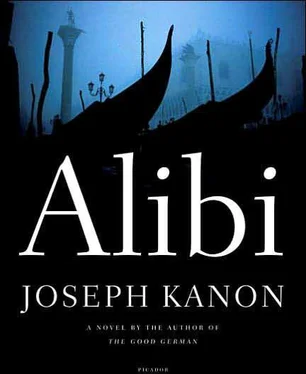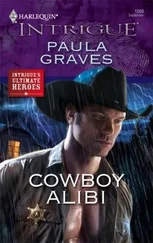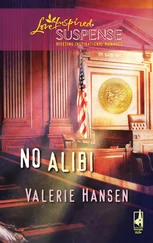Joseph Kanon - Alibi
Здесь есть возможность читать онлайн «Joseph Kanon - Alibi» весь текст электронной книги совершенно бесплатно (целиком полную версию без сокращений). В некоторых случаях можно слушать аудио, скачать через торрент в формате fb2 и присутствует краткое содержание. Жанр: Триллер, на английском языке. Описание произведения, (предисловие) а так же отзывы посетителей доступны на портале библиотеки ЛибКат.
- Название:Alibi
- Автор:
- Жанр:
- Год:неизвестен
- ISBN:нет данных
- Рейтинг книги:3 / 5. Голосов: 1
-
Избранное:Добавить в избранное
- Отзывы:
-
Ваша оценка:
- 60
- 1
- 2
- 3
- 4
- 5
Alibi: краткое содержание, описание и аннотация
Предлагаем к чтению аннотацию, описание, краткое содержание или предисловие (зависит от того, что написал сам автор книги «Alibi»). Если вы не нашли необходимую информацию о книге — напишите в комментариях, мы постараемся отыскать её.
Alibi — читать онлайн бесплатно полную книгу (весь текст) целиком
Ниже представлен текст книги, разбитый по страницам. Система сохранения места последней прочитанной страницы, позволяет с удобством читать онлайн бесплатно книгу «Alibi», без необходимости каждый раз заново искать на чём Вы остановились. Поставьте закладку, и сможете в любой момент перейти на страницу, на которой закончили чтение.
Интервал:
Закладка:
I said nothing, kept quiet by her stare. Then her face began to change, no longer as properly arranged as the tray, and I saw that she was distressed, waiting for me to say something.
“He wouldn’t do that,” she said. “You knew him. Do you think he would do that?”
“I think it was just a question.”
“Then why-”
“Something may have put it in his mind. Something that actually happened. The story about the partisan-when did he tell you that?”
“When? Last year,” she said, composed again, interested.
“After the war?” I said, confused.
“No. I mean the year before. Forty-four. When he came to see me. I remember he told me at lunch.”
“When was this, exactly?”
“Autumn. October, maybe.”
“Why did it come up? I mean, why do you think he told you?”
She smiled a little, shaking her head. “Maybe to make me like him. Always we were arguing then. So maybe this was his way of saying, You see, Papa’s not so bad. I’m on the right side too.”
“But he never actually said he’d done this.”
“No, but that wasn’t his way. He never talked about himself. Maybe he thought it wasn’t dignified. He was private, a Maglione. My mother was like that too.”
“Secretive?”
“No. Private,” she said, making a distinction to herself. “I never knew what he was thinking. But what does a child know? All those years, here we are in this house, a family, and I never knew-” She leaned forward, placing the cup on the tray. “Maybe a little secretive. A doctor has to be, you learn that. You don’t talk about your patients. I used to ask him things and he’d say, ‘That’s not my secret to tell.’ Always somebody else’s secret. ‘I won’t tell,’ I’d say, and he’d wag his finger, like this,” she said, demonstrating, so that I looked up, seeing Gianni. “You know the old saying.” She lowered her voice, becoming him. “Two people can keep a secret, if one of them is dead.” She paused. “So I didn’t ask. And then it turned out he must have had one of his own.”
“What do you mean?”
“He was murdered. Do you know why? No. So it’s still his secret.”
I sat back, looking around the room to avoid her gaze. “Well, it’s safe here. There’s nothing else? Files?”
“At the hospital. His real life was there, I think,” she said, her voice wistful. “Not here.”
There was an awkward pause.
“I should go,” I said, getting up. “Maybe there’ll be something in the patient files. That’s next. He seems to have erased himself everywhere else.”
“Yes, he was good at that. He didn’t like to keep things.”
I smiled, glancing around the old library, virtually an archive.
“Oh, this was Paolo. Poor Paolo, Papa erased him too. Threw out his books. You know, he was always writing in those books- appunti for the family history, and Papa said they were rubbish. Well, what did he expect? Mazzini from Paolo? But, you know, now it just stops. Unless I write it, I suppose,” she said, her voice diffident, as if she were talking to herself, suddenly alone.
“Wait. Paolo kept notebooks and your father threw them out?”
“Not all. Just the ones with his activities. ‘What will people think later?’ he said. It was an embarrassment for him.”
“But where are they?”
She gestured toward the shelves.
“Paolo kept them here?”
She looked at me, puzzled. “It was his house.”
“Yes, I forgot. But you all lived here?”
“Of course. The family.”
“All during the time they-?”
“Yes. There was an agreement-no political talk at dinner.”
I imagined them sitting at the starched table, private, talking politely, each one whirling in his own mystery.
“Can I see them?”
“Yes, of course,” she said, walking over to the shelf. “I’m sorry. I thought, my father’s papers. It didn’t occur to me. These are Paolo’s.” She ran her hand along a line of leatherbound spines.
The books weren’t histories so much as diaries, the kind a fourteen-year-old might write, full of underlinings and exclamation marks, the world a theater with himself, luckily, at center stage. Even with my poor Italian, I could understand Gianni’s reluctance to have them fill the family library’s shelves. But here they were, not all of them thrown out. Why not?
I skimmed through a few, trying to get a sense of why these had survived. Innocuous? But here was Mussolini, a trip to Rome with friends to hear a speech, dinner afterward at the Eden-a time capsule mix. Not embarrassed here, at any rate, by the fascism or Paolo’s comments. The speech had been inspiring, Rome itself a new city. A nightclub after dinner had featured Somalian dancers. Venice now seemed a backwater, dowdy. I flipped pages. Less exalted excursions-a drive to Asolo, dinner in a villa. The Maglione history now mostly idle days. Committee meetings, just as Giulia had said. Recording it all for posterity. The war, somber fourteen-year-old’s thoughts on what it would mean. The Albanian fiasco. The Allies in Sicily. And then it stopped. Gaps here and there before, then nothing after 1943. A war with no Germans at all. But why the earlier gaps? What else had Gianni culled out?
Giulia had been hovering next to me, reading as I flipped, no doubt taking it all in more quickly. “But what do you see?” she said.
“I don’t know. Nothing, I guess. Can I borrow these? Just the last few?”
“You want to read them?”
“I want to see where the gaps are. Look, here, for instance, he just ripped the pages out. So why here and not there?”
But before she could answer there was another rap on the door, and this time Maria was carrying an old telephone with a long cord, her eyes wide with apprehension.
“ Polizia,” she whispered, pointing to me, then plugged the cord into a jack behind the desk.
Had Cavallini tracked me here? I picked up the phone and then must have registered the stunned dismay I felt as he spoke, because when I hung up, Giulia said, “My god, what is it? What’s happened?”
“Cavallini,” I said, my own voice an echo, hollow. “They’ve arrested somebody for the murder.”
CHAPTER THIRTEEN
The Questura was like Gianni’s hospital-functional, even ordinary inside. Cavallini’s office could have been anywhere, a room with a desk and a phone and pale green institutional walls. There was a large map of the lagoon along with a few photographs of Cavallini shaking hands with various officials, but it still felt scarcely inhabited, as if he had just moved in, waiting for a new paint job. Today, at least, it was crowded with people-assistants delivering telephone messages, two policemen standing near the door waiting for orders, and a tall man in a suit conferring with Cavallini, stroking his chin in thought. I saw all this in a blur, my mind still numb with dread.
“Signor Miller,” Cavallini said, smiling. “Good. My superior wants to meet you.” The tall man turned to me. “I have told him how it started with you.”
We shook hands, with a few polite words in Italian, then he rattled off something to Cavallini.
“So everyone is very pleased,” Cavallini said. “I thank you for this.” He put his hand on the beige folder, Rosa’s file. “Of course, it’s a question of police work too,” he said, directing this to the tall man, who smiled blankly, clearly not following. “The one helps the other. Una collaborazione.” At this the other man nodded, said something more in Italian, and left, dipping his head toward me, almost a bow, as he went out the door. The two waiting policemen followed him.
“You see? Very pleased. So again I thank you.”
“But who did you arrest?” I said.
Читать дальшеИнтервал:
Закладка:
Похожие книги на «Alibi»
Представляем Вашему вниманию похожие книги на «Alibi» списком для выбора. Мы отобрали схожую по названию и смыслу литературу в надежде предоставить читателям больше вариантов отыскать новые, интересные, ещё непрочитанные произведения.
Обсуждение, отзывы о книге «Alibi» и просто собственные мнения читателей. Оставьте ваши комментарии, напишите, что Вы думаете о произведении, его смысле или главных героях. Укажите что конкретно понравилось, а что нет, и почему Вы так считаете.












